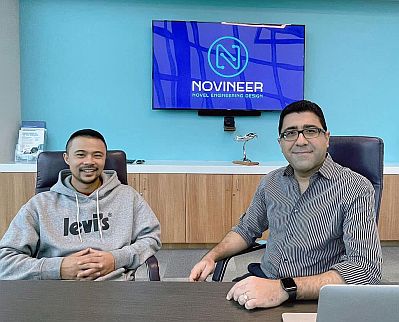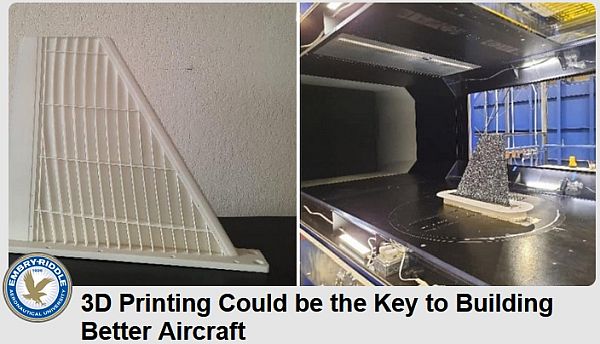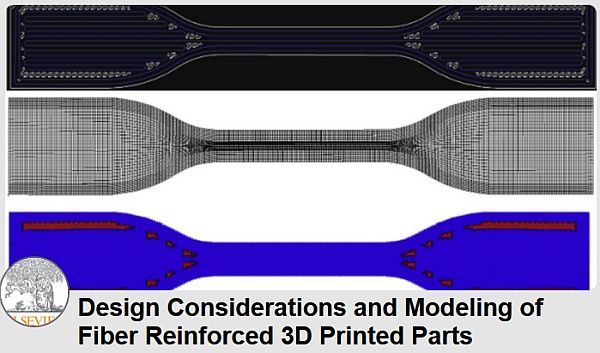Florida Startup Takes 3D Printing to the Next Level
A game-changing idea born at Embry-Riddle Aeronautical University in Florida promises faster, more environmentally benign production of lightweight, high-quality aircraft and rocket parts, biomedical implants, and a host of other consumer products.

Novineer co-founders: (left) Ph.D. student Dr. Zhichao Wang, who is now a postdoctoral fellow and the company's chief technical officer and (right) Embry-Riddle professor of Aerospace Engineering Dr. Ali Tamijani Tamijani
Novineer, named for its novel engineering solutions, hopes to advance aviation, space exploration, manufacturing and the global 3D printing market.
The company's big idea -- design and simulation software -- could accelerate the widespread use of 3D printing in the manufacture of a wide range of end-use parts and products. That seismic shift would advance the 3D printing industry, reduce production cost and time, and open the door to new business enterprise, according to Embry-Riddle faculty member Dr. Ali Tamijani Tamijani, a professor of Aerospace Engineering and the brainchild of the idea.
How does it work? Novineer's software can simplify and accelerate the process of designing, modeling and fabricating high-performance 3D-printed parts. Using the technology, a design that might take four days to complete using current methods could be accomplished in no more than four hours with Novineer's software, for example.

The company was born out of three research projects: multi-metal 3D printing for NASA, composite 3D printing technology for the U.S. Navy and what is known as latticework for the National Science Foundation. The variety of projects reflects the diverse ways in which 3D printing can be used, each of which requires an optimized design for the application -- which is where Novineer comes in.
"Our vision is to become the design hub for 3D printing," said Tamijani, adding that he and his team focus on including manufacturing constraints, material properties and system requirements in the design process "to unlock and 'unlimit' innovation by product engineers. We don't want them to be held back by all the limitations that current software sets. Our vision is to streamline the design and simulation process for 3D printing."
Ongoing Accolades
Right from the start, Tamijani and his team have been on a winning streak. The winner of both a 2019 National Science Foundation Early Career Award and the U.S. Air Force Office of Scientific Research Young Investigators Research Program Award in 2017, Tamijani has also been recognized as the University's (2020) and College of Engineering's (2019) Outstanding Researcher of the Year. "These awards are a testament to the hard work and dedication of our research team," he said.

Tamijani and his company recently won an investment of $50,000 from StarterStudio, a nonprofit tech startup accelerator with which Embry-Riddle has partnered. The August 2022 grant was the largest initial investment that StarterStudio has ever made from the Volusia County Seed Fund. In October, the company won second place and an additional $30,000 in the Florida Venture Forum Early-Stage Capital Conference. The company leaders have signed an option agreement for two patent applications with Embry-Riddle.
Tamijani founded the company about eight months ago with his former Ph.D. student Dr. Zhichao Wang, who is now a postdoctoral fellow and the company's chief technical officer. Working on related 3D printing design technologies are three Ph.D. students, one master's student and an undergraduate in Tamijani's research group.
Wang said participating in an NSF program known as i-CORPS helped transition the company from an academic project to a viable business. "Before, we were thinking like engineers and scientists, focused on our invention and technology," Wang said. "But business people are thinking, 'I have a problem. I don't care what your method is.' We made contacts and learned how to focus on the customers' needs and the values we deliver to them."
Want more information? Click below.
Rate this article
View our terms of use and privacy policy ::m::